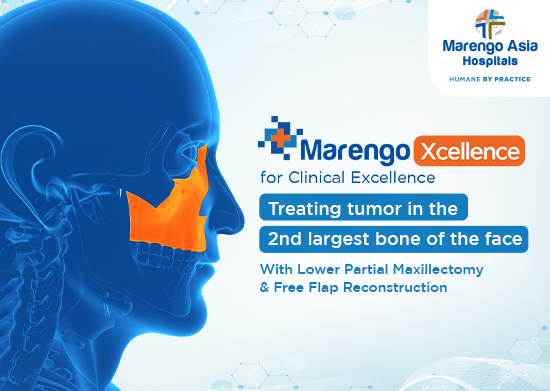Call Us
|
MAH Faridabad 0129-6935059 |
|
MAH Gurugram 0124-4131011 |
| MCIMS Ahmedabad 079-48051904 |
| Brain Stroke Helpline Gurugram 1800-309-0247 |

This case highlights a successful intraoral lower partial maxillectomy with free flap reconstruction performed on a patient diagnosed with a giant cell tumor of the maxilla. The surgery was led by Dr. Piyush Kumar Agrawal, Clinical Director and Head of Surgical Oncology at Marengo Asia Hospitals, Gurugram.
The patient, Munira, presented with a growth on the left maxillary floor and upper alveolus. Following extensive assessment at Marengo Asia Hospitals, it was determined that this was a giant cell tumor of the maxilla. Because of the complexity of the lesion and its location, the case was submitted to Dr. Agrawal and his team of qualified surgeons for comprehensive management. The procedure performed was intraoral lower partial maxillectomy.
General anesthesia was given to the patient for the procedure. The surgical team completed a lower partial maxillectomy with successful free flap reconstruction for filling in the defect left after the resection of the tumor. Such advanced techniques reconstruct both form and function thus attaining the most optimal results for aesthetics and oral functionality.
The patient recovered well without any complications and was discharged in excellent condition. Successful management of the case by the team of Surgical Oncology at Marengo Asia Hospitals epitomizes knowledge in managing complex head and neck tumors with proper amalgamation of free flap reconstruction techniques.
Marengo Asia Hospitals stands for the philosophy of patient-centricity and therefore, ranks high in the treatment of cancer. Our complex and advanced surgical treatments involve technical procedures like maxillectomy coupled with free flap reconstruction, which is a truly complex procedure that requires the tactics of multidisciplinary team efforts and very delicate workmanship.
Under the mentorship of Dr. Piyush Kumar Agrawal, the professional team at Marengo Asia Hospitals is very much devoted to providing personalized care. They recognize that every patient's case is unique and develop individualized treatments according to the patient's medical and personal needs. Such a patient-first approach guarantees effective cancer treatment and optimal recovery in functionality, aesthetics, and quality of life.